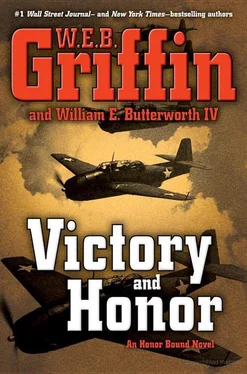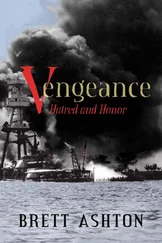“You were flying the Constellation?” Dooley replied.
“He was,” Clete said, pointing at von Wachtstein.
“‘ East Germany’?” von Wachtstein parroted. “What’s that?”
“Technically, it is the Soviet zone of occupied Germany,” Mattingly said.
“And in another couple of minutes,” Dooley said, “you’d have been over it, Captain—and probably got your ass shot down.”
“By the Russians?” von Wachtstein asked.
“Why would the Russians shoot down an unarmed Argentine passenger aircraft?” Siggie Stein asked.
“Maybe they don’t like Argentines,” Frade offered.
“Unfortunately, Clete,” Mattingly said, “there is a slight but real chance—one-in-three or -four, I would judge—that you would’ve been taken under fire by Russian aircraft had not Colonel Dooley here caused you to alter course. Or have been ordered—this is my most likely scenario—to land at Leipzig and interned. You were east of Fulda when Colonel Dooley turned you.”
“Now I want to know what the hell’s going on,” Frade said.
“I recognize that voice. You’re the guy on the radio,” Dooley accused. “You’re the wiseass who called me Little Brother!”
“I plead guilty to both charges and throw myself on the mercy of the court,” Frade said.
“I wondered what that Little Brother business was all about,” von Wachtstein said.
“As a fighter pilot, Colonel Dooley,” Frade said, “I’m surprised you don’t know that the wings of your P-38 are a minor design variant of the wings of a Constellation. Hence ‘Little Brother.’”
“What do you know about what fighter pilots should know, wiseass?” Dooley exploded.
“Well, I agree with those who say most of them should not be allowed in public without their psychiatric nurses,” Frade said, smiled, and sipped his whiskey.
“With certain exceptions, of course,” von Wachtstein chimed in.
“Fuck you, too!” Dooley exploded.
Frade and von Wachtstein laughed.
“Before this gets any further out of hand, Colonel Dooley,” Mattingly said, “for your general fund of knowledge, I think I should tell you that these gentlemen are pulling your chain.”
Dooley was Irish. Once his ire was ignited, it did not go out easily.
“Meaning what?” Dooley demanded.
“They are—or were—fighter pilots.”
“And then we grew up and they let us fly real airplanes,” Frade said.
He and von Wachtstein laughed again.
“That one,” Mattingly said, pointing to von Wachtstein, “received the Knight’s Cross of the Iron Cross from the Führer himself for his services as a fighter pilot. And that one”—he pointed to Frade—“had seven, I believe they’re called ‘meatballs,’ painted on the nose of his Grumman Wildcat.”
Dooley looked at Frade.
“No shit?” he asked. “Seven Jap kills?”
Frade nodded, then said, “But no convertibles. What the hell was that on your nose?”
“None of your fucking business,” Dooley flared anew.
“What did you do, pop some poor bastard out for a Sunday drive?” Frade pursued.
“Go fuck yourself,” Dooley said.
“All right, enough!” Mattingly said. “I’ll stand you all to attention, if that’s what I have to do.”
Dooley looked at von Wachtstein and said, “You’re telling me he was a Kraut fighter pilot? What the fuck . . . ?”
“Stand to attention, Colonel!” Mattingly ordered. “I said enough.”
“I’d like to know about the convertible,” von Wachtstein said, his tone of voice no longer joking or mocking.
“Go fuck yourself,” Dooley said.
“You’re at attention, Colonel!” Mattingly said, coldly furious. “You say one more word without permission and I’ll send you back to General Halebury under arrest pending trial for insubordination!”
Dooley stood to attention.
After sixty seconds, which seemed much longer, Mattingly asked, “Is your temper and foul mouth under control, Colonel Dooley?”
“Yes, sir.”
“Stand at ease,” Mattingly said, then turned to von Wachtstein. “Was your question about the convertible serious, von Wachtstein, or more of this sophomoric bantering?”
“It was serious, sir. I had a reason for asking.”
“Answer von Wachtstein’s question, Colonel Dooley,” Mattingly said.
Dooley shook his head, exhaled audibly, and with visible reluctance said, “When we were in Tunisia, we were flying interdiction missions—shoot anything that’s moving—and I shot up a Kraut staff car on the desert.”
“And then had it painted on your nose?” Frade asked disgustedly. “Jesus Christ!”
“That’s enough out of you, Clete,” Mattingly said.
Dooley went on: “I didn’t have it painted on my plane until General Halebury made it mandatory. That was much later, after we came to Europe. He said painting swastikas on the noses inspired junior officers.”
“And you didn’t?” Mattingly asked.
“When General Mattingly issued the order, I had four kills. What they were was that powered glider, the ME-323—”
“The Gigant,” von Wachtstein said and, when he saw Clete’s look, added, “We saw one just now. Very large aircraft, originally designed as a glider. Then they added four engines. It carries a great deal, very slowly.”
Clete, remembering, nodded.
“I got my four kills on one day,” Dooley said. “They were flying low across the Mediterranean at maybe one hundred twenty-five miles an hour. It wasn’t aerial combat; it was murder. So I never painted swastikas for them on my nose. And then we’re getting ready for the invasion, in England, and Halebury issues the order to paint kills on the nose. Still, I don’t. And he sees my plane and eats my ass out. So then I painted four swastikas and the staff car on my nose.”
“I saw seven swastikas,” Clete said.
“I got two Messerschmitt Bf-109s and a Focke-Wulf Fw-190 after the invasion.”
“Do you remember where you strafed the staff car?” von Wachtstein asked softly. “And when?”
Dooley looked at him curiously, but after a moment answered: “About half past three on the afternoon of April seventh, 1943. Right outside Sidi Mansour, Tunisia. I remember that because when I got back, my squadron CO and the exec didn’t—and I got the squadron and my railroad tracks. Why do you want to know? Is it important?”
“You made just the one pass?” von Wachtstein asked. “You didn’t go back to make sure everybody was dead?”
“There were just two people in the car,” Dooley replied. “Both in the front seat. I saw the car go off the road and turn over. There was no need to make a second pass. Why do you need the details?”
“On the afternoon of seven April 1943, near Sidi Mansour, while riding in a staff car, a friend of mine serving in the Afrikakorps was attacked by an American P-51 Mustang. His car went off the road and overturned. Were you flying a P-51, Colonel?”
Dooley nodded. “You knew this guy?” he asked.
Von Wachtstein nodded. “Quite well. We were good friends. He told me what had happened to him. His name was Claus von Stauffenberg. Oberstleutnant Graf Claus von Stauffenberg—the officer who later saw it as his duty to try to kill Hitler.”
“The guy with the bomb under the table that didn’t go off?” Dooley asked.
“The bomb went off,” Mattingly said. “But the force was deflected from Hitler by the massive leg supporting the table. Hitler lived, and later that day the SS stood Colonel von Stauffenberg against a wall on Bendlerstrasse in Berlin and executed him with Schmeisser submachine-gun fire.”
“I don’t know how to handle something like this,” Dooley said. “If I’m supposed to say I’m sorry, I’m sorry. Hell, I was sorry when I did it.”
Читать дальше












